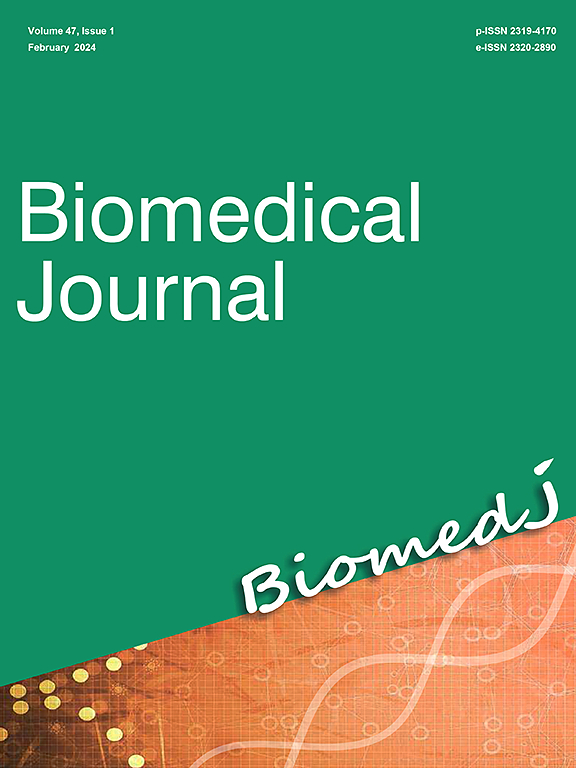新型人工磷酸三钙和镁复合移植物可促进骨愈合过程中的血管生成。
IF 4.1
3区 医学
Q2 BIOCHEMISTRY & MOLECULAR BIOLOGY
引用次数: 0
摘要
背景:骨移植是治疗严重骨缺损的标准方法,但自体移植存在供体部位发病率高、可用性有限等局限性,而商用人工移植可能与周围骨组织结合不佳,导致愈合延迟。镁的缺乏会对血管生成和骨修复产生负面影响。因此,在合成生物材料中加入镁元素可以提供极佳的骨替代品。本研究旨在评估由磷酸四钙(TTCP)和一水磷酸一钙(MCPM)组成的磷酸钙骨水泥(CPC)海绵的形态、机械和生物特性:本研究旨在开发主要由 TTCP 和 MCPM 粉末、镁粉和胶原蛋白组成的生物医学材料。材料采用湿法搅拌研磨和冷冻干燥法制备。研究了材料的粒度、成分和微观结构。最后,还评估了这些材料的生物特性,包括 3-(4,5-二甲基噻唑-2-基)-2,5-二苯基溴化四氮唑(MTT)生物相容性测定、碱性磷酸酶(ALP)活性测定和耐酒石酸磷酸酶(TRAP)活性测定对骨细胞分化的影响,以及血管生成的内皮细胞管形成测定:数据显示,由 TTCP/MCPM 以 3.5:1 的比例组成的亚微米 CPC 粉末的凝固时间短于 15 分钟,抗压强度为 4.39±0.96 兆帕。这表明亚微米 CPC 粉末具有足够的凝固时间和机械强度。我们发现,含镁的亚微米 CPC 海绵具有更好的生物相容性,包括增殖和成骨诱导效应,且无细胞毒性。含镁的 CPC 海绵还能促进血管生成:综上所述,我们介绍了一种新型 CPC 海绵,它具有与人类骨骼相似的特性,能促进骨细胞的生物功能,可作为一种有前途的材料用于关键骨缺损的骨再生。本文章由计算机程序翻译,如有差异,请以英文原文为准。
Novel artificial tricalcium phosphate and magnesium composite graft facilitates angiogenesis in bone healing
Background
Critical bone defects pose a significant challenge for orthopedic surgeons. Autologous bone grafting is the golden standard. However, it is hindered by issues such as donor site morbidity and limited availability. Commercially available artificial bone grafts may encounter challenges in properly integrating the surrounding bone tissue, potentially leading to delayed or incomplete healing. Furthermore, magnesium deficiency has been shown to negatively affect localized angiogenesis and bone repair. As a result, creating a synthetic biomaterial that includes magnesium could serve as an excellent bone substitute. The study aims to evaluate and test the morphological, mechanical, and biological properties of a calcium phosphate cement (CPC) sponge composed of tetracalcium phosphate (TTCP) and monocalcium phosphate monohydrate (MCPM).
Methods
This study aims to develop biomedical materials composed mainly of TTCP and MCPM powder, magnesium powder, and collagen. The materials were prepared using a wet-stirred mill and freeze-dryer methods. The particle size, composition, and microstructure of the materials were investigated. Finally, the biological properties of these materials, including 3-(4,5-dimethylthiazol-2-yl)-2,5-diphenyltetrazolium bromide (MTT) assay for biocompatibility, effects on bone cell differentiation by alkaline phosphatase (ALP) activity assay and tartrate-resistant acid phosphatase (TRAP) activity assay, and endothelial cell tube formation assay for angiogenesis, were evaluated as well.
Results
The data showed that the sub-micron CPC powder, composed of TTCP/MCPM in a 3.5:1 ratio, had a setting time shorter than 15 min and a compressive strength of 4.39 ± 0.96 MPa. This reveals that the sub-micron CPC powder had an adequate setting time and mechanical strength. We found that the sub-micron CPC sponge containing magnesium had better biocompatibility, including increased proliferation and osteogenic induction effects without cytotoxicity. The CPC sponge containing magnesium also promoted angiogenesis.
Conclusion
In summary, we introduced a novel CPC sponge, which had a similar property to human bone promoted the biological functions of bone cells, and could serve as a promising material used in bone regeneration for critical bone defects.
求助全文
通过发布文献求助,成功后即可免费获取论文全文。
去求助
来源期刊

Biomedical Journal
Medicine-General Medicine
CiteScore
11.60
自引率
1.80%
发文量
128
审稿时长
42 days
期刊介绍:
Biomedical Journal publishes 6 peer-reviewed issues per year in all fields of clinical and biomedical sciences for an internationally diverse authorship. Unlike most open access journals, which are free to readers but not authors, Biomedical Journal does not charge for subscription, submission, processing or publication of manuscripts, nor for color reproduction of photographs.
Clinical studies, accounts of clinical trials, biomarker studies, and characterization of human pathogens are within the scope of the journal, as well as basic studies in model species such as Escherichia coli, Caenorhabditis elegans, Drosophila melanogaster, and Mus musculus revealing the function of molecules, cells, and tissues relevant for human health. However, articles on other species can be published if they contribute to our understanding of basic mechanisms of biology.
A highly-cited international editorial board assures timely publication of manuscripts. Reviews on recent progress in biomedical sciences are commissioned by the editors.
 求助内容:
求助内容: 应助结果提醒方式:
应助结果提醒方式:


